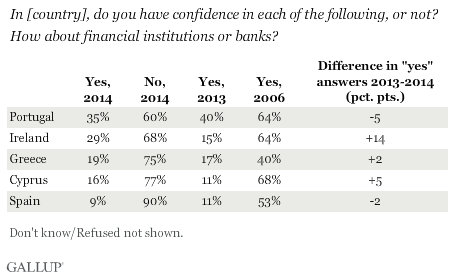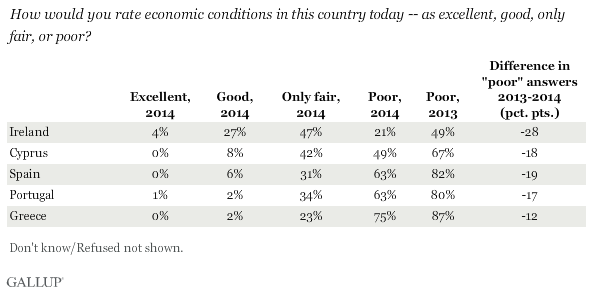WASHINGTON, D.C. -- Although fears of an immediate collapse of the euro are receding, most residents in bailout countries still do not put much faith in their financial institutions. So far, trust is returning only in Ireland. Irish confidence in their banks has nearly doubled since the country became the first in the eurozone to exit its $91 billion bailout program in December 2013. However, even Irish banks still have a long way to go before trust reaches the levels seen before the crisis.

Although Spain exited its bailout program shortly after Ireland in January 2014, Spaniards' trust in their banks so far shows no signs of recovery. In spring 2014, 9% of Spaniards expressed confidence in their financial institutions and banks. This public sentiment is in line with evaluations of many financial experts, such as Moody's, who see Irish banks in a stronger position compared with their Spanish counterparts. According to Moody's, Irish banks have the potential to show the most notable improvement over the remainder of 2014 and through 2015 thanks in part to higher economic growth in the country.
Portugal emerged from its international bailout in May 2014. However, data collection in Portugal took place between April and June, overlapping the country's exit. In 2014, 35% of Portuguese adults expressed confidence in their banks, slightly less than in 2013 (40%), but still far more than in neighboring Spain. Unlike the crises in Ireland, Spain, and Cyprus, Portugal's was primarily a sovereign debt crisis at the time rather than a banking crisis.
Meanwhile, trust in Cyprus' financial institutions has not improved significantly: In 2013, 11% of Cypriots expressed confidence vs. 16% this year. In Greece, confidence in banks remained stable at 19%.The two nations are still receiving disbursements from their bailout programs. However, as the threat of the region's debt crisis recedes, both have successfully returned to public debt markets.
Despite Recovery, Majority of Spaniards Rate Economic Conditions as Poor
With the end of the eurozone's 18-month-long recession in late 2013, economic optimism among residents of countries that received bailouts has risen. In all five countries, residents have become significantly less likely to view economic conditions as poor. Yet, there seems to be more relief than euphoria, with fewer than one in 10 Spaniards, Portuguese, Greeks, and Cypriots rating their country's economic conditions as good or excellent.
In Spain, however, nearly two in three adults (63%) continue to rate economic conditions in the country as poor. Considering that the official unemployment rate is still one of the highest in the developed world (24.5%), it is hardly surprising that few Spaniards are upbeat about their economy despite 0.6% GDP growth in the second quarter. In Ireland, where the economy is recovering at a much faster pace (2.7% GDP growth in the first quarter), 31% now rate economic conditions as good or excellent, up from 15% last year.

Among countries hit hardest by the eurozone crisis, the economic mood is the worst in Greece, with three-quarters of adults describing economic conditions as poor this summer. However, in early September, the Greek government announced its expectation to return to growth in the third quarter for the first time since 2008.
Enda Kenny's Government Restores Some Trust
Improving economic conditions that allowed Ireland to exit the European Union-International Money Fund bailout may have contributed to a small increase in confidence in the national government. More than one in three (37%) Irish say they are confident in their national government in 2014, up from 29% last year. Yet, confidence in the Irish government might have recovered more substantially if the Enda Kenny administration had not been implicated in a controversy over phone tapings, which made headlines shortly before the survey in March 2014.
![In [country], do you have confidence in each of the following, or not? How about the national government?](http://content.gallup.com/origin/gallupinc/GallupSpaces/Production/Cms/POLL/lo3kmhu1ee6etnmfqcuubg.png)
In the four southern European countries, perceived improvements of the economy have not yet translated into significant increases in residents' confidence in their national governments. Spaniards are the most likely to say that they do not have confidence in their government (84%). One likely contributing factor to these low levels of popularity of the Rajoy administration, besides continuously high unemployment, are allegations of illegal party funding that involve Spain's prime minister.
Implications
Although lower borrowing costs and the end of recession in the eurozone in late 2013 alleviated fears of the euro's imminent collapse, most residents of Spain, Portugal, and Greece continue to rate economic conditions in their countries as poor. Furthermore, residents' confidence in these countries' financial institutions and governments remains historically low. In Ireland, confidence in these institutions is slowly recuperating, aided by quickly growing GDP, lower unemployment, and improving banks asset quality. However, the situation in Ireland also shows that although the public's trust in financial institutions and government can evaporate quickly, regaining it is likely to be a long-term task.
For complete data sets or custom research from the more than 150 countries Gallup continually surveys, please contact us.
Survey Methods
Results are based on telephone (Ireland, Spain, Portugal, and Cyprus) and face-to-face interviews (Greece) with approximately 1,000 adults, aged 15 and older, per country per year. In Cyprus, the Turkish-controlled areas in the north were excluded and previous to 2013 only 500 interviews were conducted each year on the island. The 2014 data were collected during the following periods:
- Ireland: April 14-May 27
- Spain: April 14-May 19
- Portugal: April 22-June 6
- Cyprus: May 6-June 27
- Greece: June 20-July 28
For results based on the total sample of national adults, one can say with 95% confidence that the maximum margin of sampling error ranges from a low of ±3.5 percentage points to a high of ±4.0 percentage points. The margin of error reflects the influence of data weighting. In addition to sampling error, question wording and practical difficulties in conducting surveys can introduce error or bias into the findings of public opinion polls.
For more complete methodology and specific survey dates, please review Gallup's Country Data Set details.
